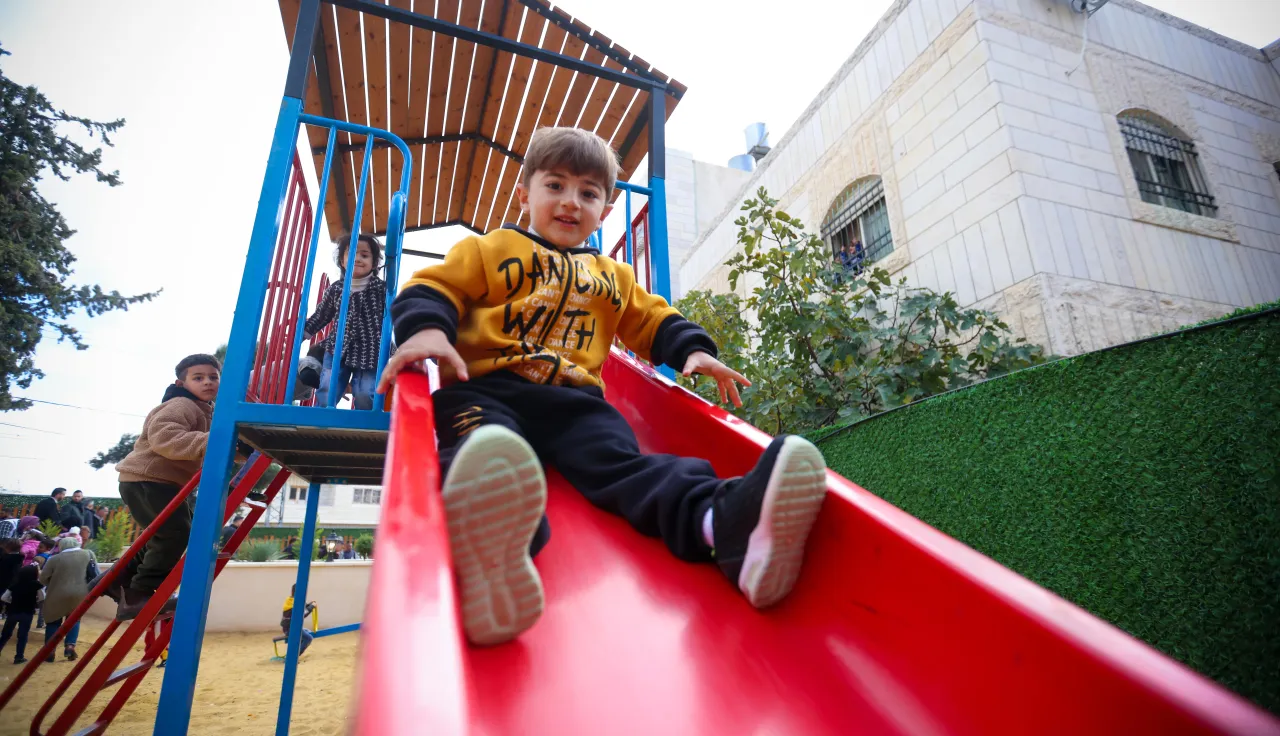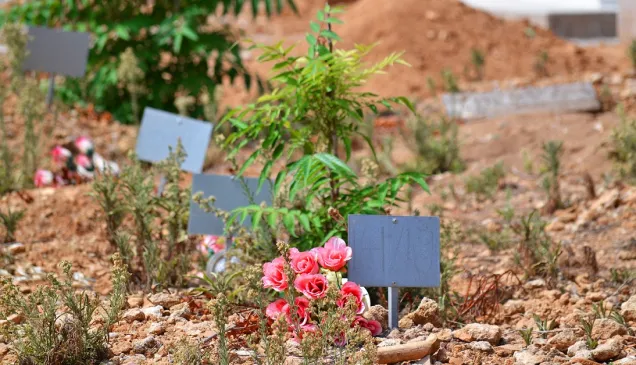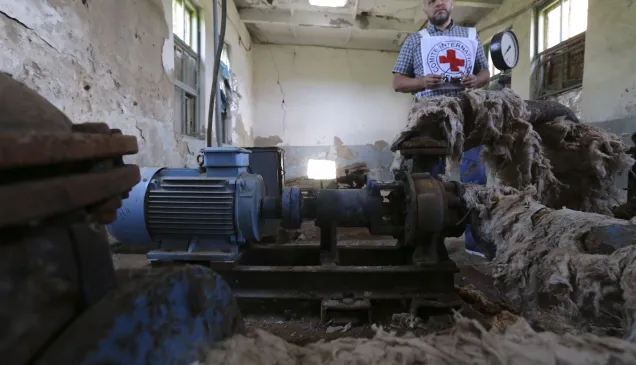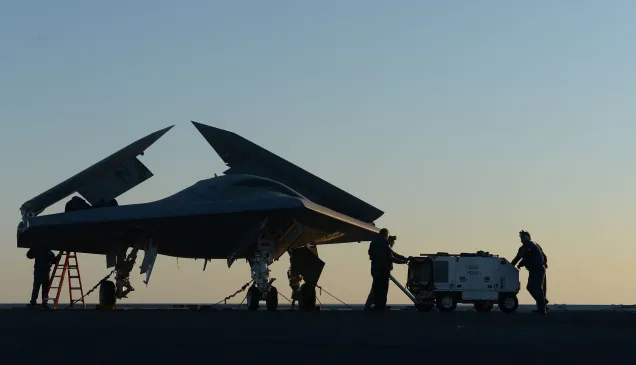√ Helping Ensure Dignity in Detention
As part of our endeavors to ensure humane treatment and conditions of detention for detainees, we carried out 555 visits to Palestinian detainees held in Israeli and Palestinian detention facilities. We also contributed to the improvement of detention conditions for around 1,960 detainees in the West Bank and the Gaza Strip.
√ Maintaining Family Links
We facilitated permits for over 54,000 family members and transported them to visit their relatives in Israeli prisons. Over 5,000 detainees were able to see their loved ones through regular visits.
We also facilitated the exchange of 50 Red Cross Messages and over 1,100 salamat (i.e., verbal greetings) between detainees and their families, and between separated families across borders.
√ Supporting Vulnerable Communities
To address the humanitarian consequences of the occupation:
- 127 families whose houses were destroyed during the armed hostilities in August 2022 in the Gaza Strip received cash grants and essential household items.
- 140 families whose houses were demolished in East Jerusalem and other locations in the West Bank received cash grants.
- 152 households with Persons with Disability (PWDs) in the Gaza Strip, 10 households with individuals severely injured by confrontations in the West Bank, and 43 vulnerable households in the “H2” restricted area of the city of Hebron received cash grants to help them start different types of businesses to support their livelihoods.
- 638 farmers in the border area of the Gaza Strip received multiple agricultural inputs (e.g., seeds, fertilizers and tools) to improve their agricultural projects.
- 420 farmers in the West Bank and Gaza Strip received ecological bio-traps to reduce the use of pesticides and help them protect their olive trees.
- 60,000 sheep and goats belonging to over 1,000 herders were vaccinated against chlamydia in partnership with the Ministry of Agriculture in the West Bank to help reduce the mortality of fetuses
- 180 herders and 137 farmers affected by settler violence and settlement expansion in the West Bank received cash grants to help them rehabilitate their animal shelters, improve animal breeding and enhance their farming.
√ Caring for the Sick and Wounded
- 3,374 PWDs were supported with physical rehabilitation services and their integration into society was promoted in partnership with the Artificial Limbs and Polio Center (ALPC) in the Gaza Strip.
- Two trainings on Fundamentals of War Surgery were organized for 73 surgeons in the West Bank and the Gaza Strip.
- 17 Basic Emergency and Trauma Management trainings were organized for 403 medical staff and Emergency Medical Technician members in the Gaza Strip.
√ Strengthening Mental Health and Psychosocial Support
- 20 social workers and psychologists at Barzilai Hospital in southern Israel received training in partnership with the Israel Trauma Coalition to assist them in improving their mental and psychosocial wellbeing.
- We continued our partnership with the Ministry of Health to support the mental and psychological wellbeing of residents in the Gaza Strip by training 36 facilitators from the Palestine Red Crescent Society (PRCS), Palestinian Civil Defence and Military Medical Services as well as the Palestine Amputee Football Association.
√ Improving Access to Water and Electricity
- Access to essential services (i.e., water, electricity and wastewater treatment) was enhanced for more than 1,750,000 residents in the West Bank and Gaza Strip.
- Within the framework of the Gaza Resilience Program (GRP), which aims to help communities and systems to absorb conflict-related shocks and recover more rapidly, this is how we helped improve living conditions for 850,000 residents in the Gaza Strip through infrastructure projects:
- the reliability and availability of electricity supply was improved through the installation of new equipment to manage electricity demand, as well as the installation of solar panels.
- the capacity of water and wastewater facilities was increased to continue to function during armed hostilities and other shocks.
√ Monitoring and Promoting Respect for International Humanitarian Law
As the promoter of International Humanitarian Law (IHL), the ICRC takes action to foster respect for the law notably by spreading knowledge of IHL to a wide range of local and international stakeholders including arms carriers, supporting its implementation at the domestic level, and monitoring respect for it by all parties and by reminding them of their obligations.
Within this framework:
- The ICRC maintains a regular dialogue with authorities and other actors on all sides to remind them of their obligations under International Humanitarian Law (IHL) and International Human Rights Law (IHRL). It shares reports and observations about respect for IHL in a confidential manner directly with all parties to the conflict.
- Throughout the first six months of 2022, we continued to promote IHL and other applicable norms among Palestinian Security Forces, official authorities, university students and community members in the West Bank and Gaza Strip.
√ Engaging with the Community
The ICRC recognizes and values community members as equal partners. To ensure that we meet the needs of those affected by conflict, who are at the heart of our work, we carried out a series of community focused engagements in 2022:
- Over 20,000 residents received awareness sessions to enhance their knowledge on the risks of Unexploded Ordnance (UXO) and promote safer behavior in the Gaza Strip.
- 20 young artists in the Gaza Strip participated in a visual art exhibition to highlight the impact of 15 years of closure on the lives of youth in the Gaza Strip.
- 60 Palestinian women from the West Bank participated in a training and exhibition focused on repurposing household waste, eight of whom also received a basic photography training to help them better promote their “green” products online.
The ICRC ensures to work closely with its partners in the Palestine Red Crescent Society (PRCS) in the West Bank and Gaza Strip, and Magen David Adom (MDA) in Israel. As part of these efforts, here is what was achieved in 2022:
- 275 new staff members and volunteers at the PRCS received training to enhance their knowledge on the International Red Cross and Red Crescent Movement and its fundamental principles, including the distinctive emblem.
- 35 MDA Emergency Medical Service staff members staff members and volunteers were deployed to Moldova and Ukraine to support ICRC pre-hospital programs.
- One workshop was co-organized with MDA to simulate the joint deployment of a Red Cross hospital at an Israeli health care facility in case of significant earthquake.




